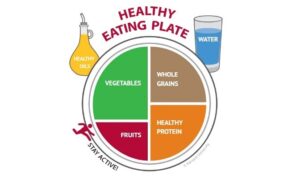Balanced nutrition entails structuring daily food intake to align with the body’s nutritional requirements. In principle, it comprises of four essential pillars recommended for maintaining overall health and functionality.
According to The Nutrition Source by Harvard T.H. Chan School of Public Health, there’s a concept called the Healthy Eating Plate, which emphasizes four key components for a balanced plate:
1. Vegetables – comprising half of our plate:
Eating green vegetables daily is a good habit. Vegetables are rich in proteins, fibres, vitamins, antioxidants, and minerals, supporting various bodily functions such as digestion, circulation, and bone health.

2. Whole grains / Complex carbohydrates – comprising a quarter of our plate:
The Whole Grain Initiative advocates for consuming grains in their whole form, such as brown rice and black rice, which retain their nutritional value and fibre content. Unlike refined grains like white rice, whole grains offer a broader spectrum of nutrients beyond just carbohydrates.
3. Healthy protein – comprising a quarter of our plate:
Proteins play a vital role in building body tissues and bolstering the immune system by aiding in the production of antibodies and immunoglobulins, which plays a protective role against viruses or bacteria. When the body creates antibodies to combat a virus or bacteria, it remembers how to produce them if it encounters the same pathogen again. This means that if the same virus or bacteria returns, the body can quickly fight it off.
4. Fruits
Similar to vegetables, fruits provide essential fibre and hydration, safeguarding cellular health and overall well-being. Alongside water, fruits consumption can help maintain body hydration.
In addition to the 4 nutritional components already mentioned, it’s important to consider the following 3 supplementary elements:
– Oils
Opt for healthy sources of fats like olive oil and avocado oil. Avoid excessive consumption of trans oil/trans-fat when consuming fried foods, as they can have adverse effects on health.

– Hydration:
Ensure adequate fluid intake, aiming for around eight glasses or 2 litres of water per day to meet the body’s hydration needs.

– Exercise
Regular physical activity is crucial for maintaining overall health. Incorporate exercise into daily routines, such as opting for stairs instead of escalators and participating in household chores.

Just as a vehicle requires appropriate fuel to function optimally, our bodies rely on balanced nutrition. Without it, our bodies cannot perform at their best. Let’s prioritize improving our dietary habits to support optimal bodily function and overall well-being.
References:
https://www.siloamhospitals.com/en/informasi-siloam/artikel/mengenal-10-pesan-gizi-seimbang
https://yankes.kemkes.go.id/view_artikel/179/pilar-utama-dalam-prinsip-gizi-seimbang









No comments yet.